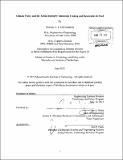| dc.contributor.advisor | Ian A. Waitz. | en_US |
| dc.contributor.author | McConnachie, D. (Dominic Alistair) | en_US |
| dc.contributor.other | Massachusetts Institute of Technology. Technology and Policy Program. | en_US |
| dc.date.accessioned | 2012-09-13T19:00:47Z | |
| dc.date.available | 2012-09-13T19:00:47Z | |
| dc.date.copyright | 2012 | en_US |
| dc.date.issued | 2012 | en_US |
| dc.identifier.uri | http://hdl.handle.net/1721.1/72902 | |
| dc.description | Thesis (S.M. in Technology and Policy)-- Massachusetts Institute of Technology, Engineering Systems Division, Technology and Policy Program, 2012. | en_US |
| dc.description | Cataloged from PDF version of thesis. | en_US |
| dc.description | Includes bibliographical references (p. 81-89). | en_US |
| dc.description.abstract | In this thesis, I assess the impact of the current EU Emissions Trading Scheme and a hypothetical renewable jet fuel mandate on US airlines. I find that both the EU Scheme up until 2020 and a renewable jet fuel mandate of 1 bn gallons per year from 2018 to 2022 would have a small impact on US airlines and emissions, and operations would continue to grow by -3% p.a. I find that if carriers pass on all additional costs to consumers in the EU Scheme, including the opportunity costs associated with free allowances, windfall gains may be substantial at about $2.6bn because under current allocation rules, airlines would only have to purchase about a third of the required allowances. However, an increase in the proportion of allowances auctioned would reduce windfall gains and profits for US airlines would decline. If airlines pass on only allowance expenses airlines do not receive windfall gains. Out-of-sector abatement is estimated at about a third of airline emissions for the North Atlantic routes, compared to the estimated 1.6% in-sector emissions reductions due largely to reductions in demand under the EU Scheme. Under proposed EU legislation, airlines can use renewable jet fuel instead of purchasing emissions allowances. I find that the current allowance price would make it cheaper for airlines to purchase renewable jet fuel only under conditions where the renewable fuel price premium is 10 cents per gallon or less. I find that a renewable jet fuel mandate of 1bn gallons per year for US commercial aviation (about 4% of the total fuel use) with renewable jet fuel price premium of $1.50 would increase airline fuel costs by ~2% and reduce greenhouse gas emissions by between 2% and 4%. Emissions would continue to grow and reach approximate 2018 levels by 2022. I use the social cost of carbon, with a baseline value of $100/tCO₂e, to calculate the societal cost-effective price premium of renewable jet. I find that fuels can have a price premium of between 40c and $1.30 per gallon, depending on life cycle greenhouse gas reduction. Renewable jet fuels examined in this thesis, including the only commercially available fuel, currently have price premiums of more than $2 per gallon and a calculated greenhouse gas abatement cost of more than $250/tCO₂e. This thesis shows that the emerging renewable jet fuel industry needs to reduce costs to achieve greenhouse gas abatement costs, and therefore societal benefits, comparable to the social cost of carbon or EU allowance costs. It also shows that for the fuels examined with currently estimated prices, the EU Scheme, and the now defunct Waxman-Markey Bill would be lower cost options of greenhouse gas abatement for airlines than a renewable fuel mandate, and in any case would not preclude the use of renewable fuels should they be produced with lower price premiums. | en_US |
| dc.description.statementofresponsibility | by Dominic A. T. McConnachie. | en_US |
| dc.format.extent | 101 p. | en_US |
| dc.language.iso | eng | en_US |
| dc.publisher | Massachusetts Institute of Technology | en_US |
| dc.rights | M.I.T. theses are protected by
copyright. They may be viewed from this source for any purpose, but
reproduction or distribution in any format is prohibited without written
permission. See provided URL for inquiries about permission. | en_US |
| dc.rights.uri | http://dspace.mit.edu/handle/1721.1/7582 | en_US |
| dc.subject | Engineering Systems Division. | en_US |
| dc.subject | Technology and Policy Program. | en_US |
| dc.title | Climate policy and the airline industry : emissions trading and renewable jet fuel | en_US |
| dc.title.alternative | Emissions trading and renewable jet fuel | en_US |
| dc.type | Thesis | en_US |
| dc.description.degree | S.M.in Technology and Policy | en_US |
| dc.contributor.department | Massachusetts Institute of Technology. Engineering Systems Division | |
| dc.contributor.department | Technology and Policy Program | |
| dc.identifier.oclc | 808490668 | en_US |
